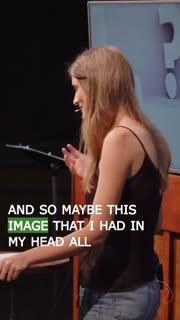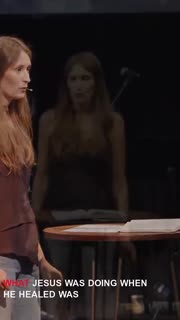Faith, Persistence, and Spiritual Sight in Healing
Devotional
Sermon Summary
Bible Study Guide
Sermon Clips
### Quotes for Outreach
1. "Faith is something that Jesus responds to. And I love the story, actually, of the bleeding woman. It's not recorded in this way in Matthew, but in other Gospels it is, that he responds to it even when he's not conscious of it. She touched, and he responded to her faith by healing her, even though he wasn't looking, he wasn't touching, he wasn't doing anything like that." [28:49] (28 seconds)
2. "So I don't know why these men had to persist in their cries for mercy while others don't. I don't know why they had to follow him for a ways before he turned to them. But what I do know is that their persistence put them into the presence of Jesus. And it was their belief that he was worth following, even when it seemed like they were getting nothing out of it, that it allowed them to experience the power of God in their lives." [48:42] (27 seconds)
3. "Without faith, Jairus would have stayed at home and mourned the death of his daughter. Without faith, the bleeding woman would have stayed in the place where the law of Moses told her that she had to remain and where her community demanded. Without faith, the blind men would not have persisted in their cries for mercy, and they would have allowed Jesus to just walk on by, leaving them behind. Without faith, they would have missed out on experiencing God's grace." [50:58] (23 seconds)
### Quotes for Members
1. "But I do believe that there is purpose. That this story wasn't just put into the Bible by mistake. That there's a value in this. That God wants to speak to us through this story. And so, I hope that we can hear the words of God to our hearts today and possibly hold a bit of tension as we think through this story." [26:14] (18 seconds)
2. "And so maybe this image that I had in my head all week of men, blind men, recognizing that Jesus hasn't stopped, now having to stumble their way through the streets of Capernaum. Maybe that picture of Jesus' back turned to them is what you have experienced. Or maybe what, as you've walked with people through difficulties and that's what it feels like is happening. That's hard. And I wish, I wish there was just some simple answer to explain it all." [41:11] (36 seconds)
3. "And so I think there is this unique sharing in the suffering of Christ that we get to experience when we find ourselves in these moments where we're calling out and it feels like Jesus is just continuing to walk away. And then there's these promises of a unique grace and blessing. Because it's for those who are poor in spirit. It's for those who mourn who Jesus calls blessed." [42:46] (29 seconds)
4. "So thank you for those of you who have walked through difficult seasons and you have chosen to not to believe the goodness of God. And I believe that he is, his ways are higher and his thoughts are higher than ours. And then you have chosen to share even in the most difficult times. To share it because it is an encouragement to the rest of us that what we read in scripture is true. You have testified to the truth of what Jesus has said." [44:27] (29 seconds)
5. "What Jesus was doing when he healed was such a small picture of what he said he was ultimately gonna do. This is just a taste. Yes, your faith has saved you for something that is far greater than just, hey, I'm healed. It's a temporary relief or temporary sight. One day, you are going to see things as they truly are in all fullness. Don't just be satisfied with temporary healing, but have the hope of everything being restored, everything being made new." [48:03] (34 seconds)
Ask a question about this sermon
1. "Faith is something that Jesus responds to. And I love the story, actually, of the bleeding woman. It's not recorded in this way in Matthew, but in other Gospels it is, that he responds to it even when he's not conscious of it. She touched, and he responded to her faith by healing her, even though he wasn't looking, he wasn't touching, he wasn't doing anything like that." [28:49] (28 seconds)
2. "So I don't know why these men had to persist in their cries for mercy while others don't. I don't know why they had to follow him for a ways before he turned to them. But what I do know is that their persistence put them into the presence of Jesus. And it was their belief that he was worth following, even when it seemed like they were getting nothing out of it, that it allowed them to experience the power of God in their lives." [48:42] (27 seconds)
3. "Without faith, Jairus would have stayed at home and mourned the death of his daughter. Without faith, the bleeding woman would have stayed in the place where the law of Moses told her that she had to remain and where her community demanded. Without faith, the blind men would not have persisted in their cries for mercy, and they would have allowed Jesus to just walk on by, leaving them behind. Without faith, they would have missed out on experiencing God's grace." [50:58] (23 seconds)
### Quotes for Members
1. "But I do believe that there is purpose. That this story wasn't just put into the Bible by mistake. That there's a value in this. That God wants to speak to us through this story. And so, I hope that we can hear the words of God to our hearts today and possibly hold a bit of tension as we think through this story." [26:14] (18 seconds)
2. "And so maybe this image that I had in my head all week of men, blind men, recognizing that Jesus hasn't stopped, now having to stumble their way through the streets of Capernaum. Maybe that picture of Jesus' back turned to them is what you have experienced. Or maybe what, as you've walked with people through difficulties and that's what it feels like is happening. That's hard. And I wish, I wish there was just some simple answer to explain it all." [41:11] (36 seconds)
3. "And so I think there is this unique sharing in the suffering of Christ that we get to experience when we find ourselves in these moments where we're calling out and it feels like Jesus is just continuing to walk away. And then there's these promises of a unique grace and blessing. Because it's for those who are poor in spirit. It's for those who mourn who Jesus calls blessed." [42:46] (29 seconds)
4. "So thank you for those of you who have walked through difficult seasons and you have chosen to not to believe the goodness of God. And I believe that he is, his ways are higher and his thoughts are higher than ours. And then you have chosen to share even in the most difficult times. To share it because it is an encouragement to the rest of us that what we read in scripture is true. You have testified to the truth of what Jesus has said." [44:27] (29 seconds)
5. "What Jesus was doing when he healed was such a small picture of what he said he was ultimately gonna do. This is just a taste. Yes, your faith has saved you for something that is far greater than just, hey, I'm healed. It's a temporary relief or temporary sight. One day, you are going to see things as they truly are in all fullness. Don't just be satisfied with temporary healing, but have the hope of everything being restored, everything being made new." [48:03] (34 seconds)








